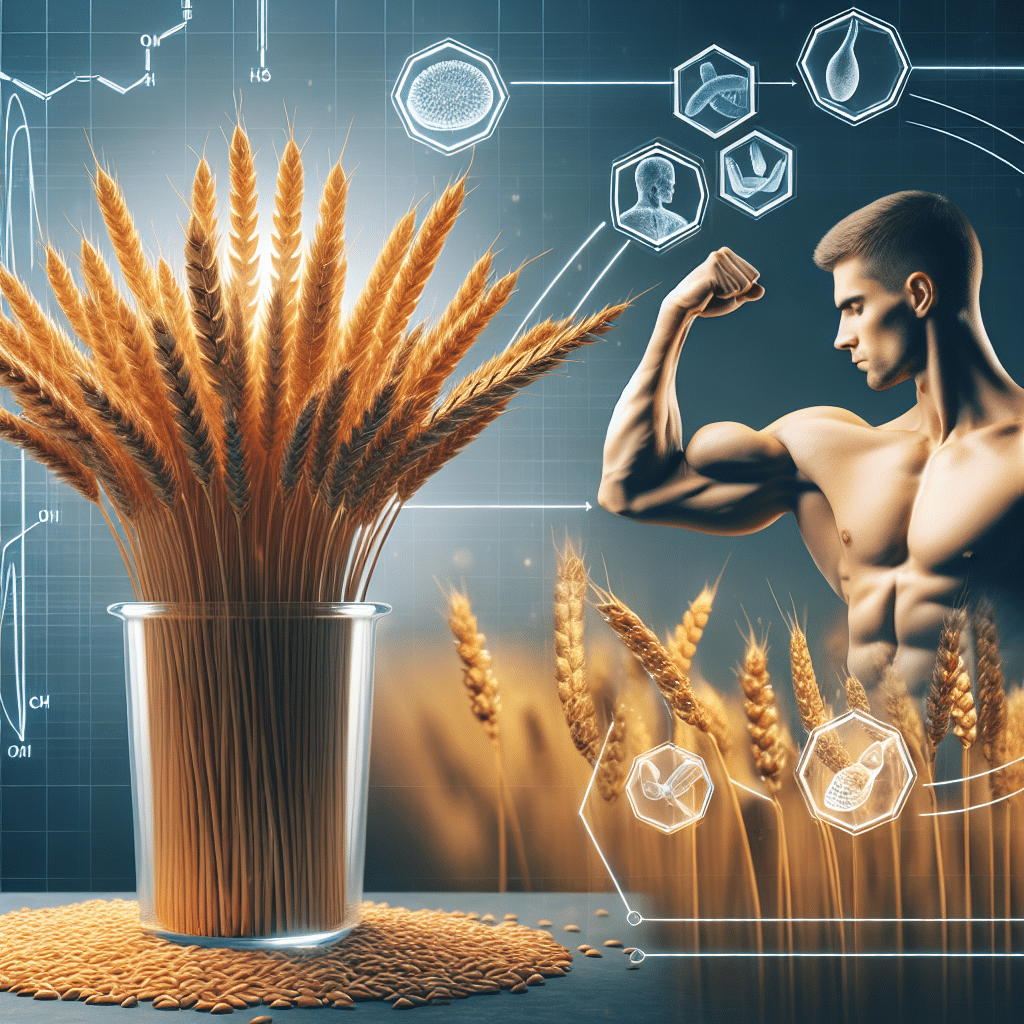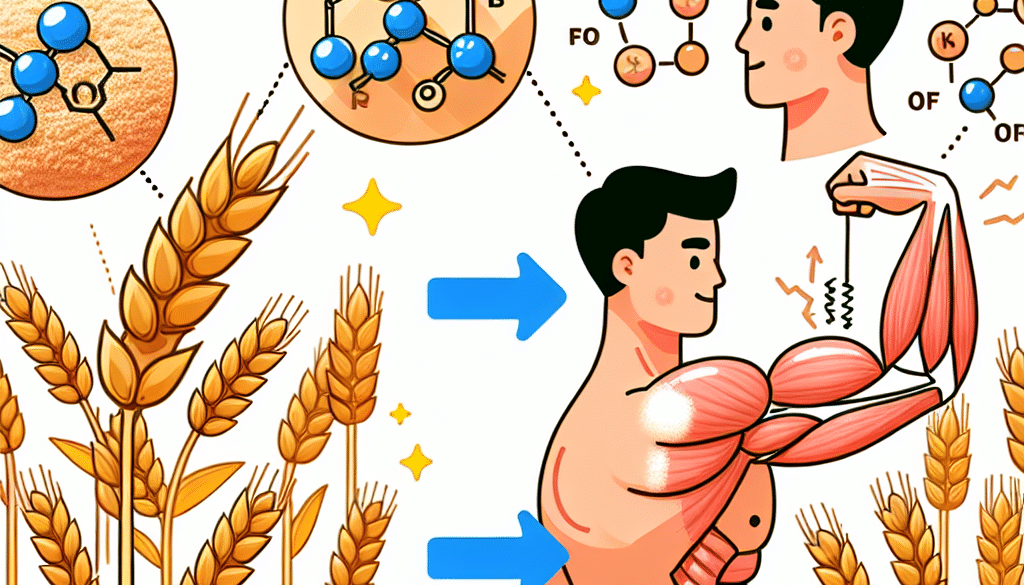Does Wheat Protein Build Muscle? The answer
Table of Contents
- Wheat Protein and Muscle Building: An In-Depth Analysis
- Understanding Wheat Protein
- Protein’s Role in Muscle Building
- Wheat Protein’s Amino Acid Profile
- Research on Wheat Protein and Muscle Growth
- Comparing Wheat Protein to Other Protein Sources
- Practical Applications for Muscle Building
- Case Studies and Anecdotal Evidence
- Conclusion: The Verdict on Wheat Protein and Muscle Building
- Discover ETprotein’s High-Quality Protein Products
Wheat Protein and Muscle Building: An In-Depth Analysis

When it comes to building muscle, protein is the cornerstone of many fitness enthusiasts’ diets. With the rise of plant-based nutrition, wheat protein has emerged as a popular alternative to animal-based proteins. But does wheat protein build muscle effectively? This article delves into the science behind wheat protein and its role in muscle synthesis, providing valuable insights for those looking to optimize their muscle-building regimen.
Understanding Wheat Protein
Wheat protein, also known as wheat gluten, is a plant-based protein derived from wheat. It is composed of two main proteins, gliadin and glutenin, which form a network of gluten when mixed with water. This gives wheat protein its unique viscoelastic properties, making it a staple in baking and meat substitutes.
Protein’s Role in Muscle Building
Protein is essential for muscle repair and growth. During resistance training, muscle fibers experience microscopic tears. The body repairs these tears by fusing muscle fibers together to form new protein strands, or myofibrils, which increase in thickness and number, leading to muscle hypertrophy (growth).
Wheat Protein’s Amino Acid Profile
The effectiveness of a protein source in supporting muscle growth is largely determined by its amino acid profile. Amino acids are the building blocks of protein, and nine of them are considered essential because the body cannot produce them on its own. Here’s how wheat protein stacks up:
- Leucine: Wheat protein contains lower levels of leucine compared to other protein sources like whey or soy. Leucine is a key branched-chain amino acid (BCAA) that plays a critical role in muscle protein synthesis.
- Lysine: This is another essential amino acid that is often limited in wheat protein, making it less effective for muscle growth on its own.
- Glutamine: Wheat protein is rich in glutamine, which can aid in muscle recovery and immune system support.
Due to its incomplete amino acid profile, wheat protein is often combined with other protein sources to create a more balanced amino acid profile that can better support muscle growth.
Research on Wheat Protein and Muscle Growth
Several studies have investigated the impact of wheat protein on muscle growth with mixed results. While some research suggests that wheat protein can contribute to muscle hypertrophy when consumed in adequate amounts, it may not be as effective as other protein sources with a more complete amino acid profile.
Comparing Wheat Protein to Other Protein Sources
When compared to whey, casein, or soy proteins, wheat protein generally falls short in terms of its ability to stimulate muscle protein synthesis. This is primarily due to its lower leucine content and incomplete essential amino acid profile.
Practical Applications for Muscle Building
For those looking to build muscle, incorporating wheat protein into a diet that also includes other protein sources can be beneficial. Here are some practical tips:
- Combine wheat protein with other plant-based proteins like pea or rice protein to create a more complete amino acid profile.
- Ensure adequate overall protein intake throughout the day to support muscle repair and growth.
- Consider timing wheat protein intake around workouts to maximize its muscle-building potential.
Case Studies and Anecdotal Evidence
While scientific research provides a foundation for understanding wheat protein’s role in muscle building, anecdotal evidence from plant-based athletes and bodybuilders suggests that it can be part of a successful muscle-building diet when used correctly.
Conclusion: The Verdict on Wheat Protein and Muscle Building
In conclusion, wheat protein can contribute to muscle growth when consumed as part of a balanced diet that includes a variety of protein sources. Its unique properties make it a versatile addition to a muscle-building diet, especially for those following a plant-based lifestyle. However, it should not be relied upon as the sole source of protein due to its incomplete amino acid profile.
Discover ETprotein’s High-Quality Protein Products
If you’re looking to incorporate wheat protein into your diet or explore other plant-based protein options, ETprotein offers a range of high-quality products. Their organic bulk vegan proteins are characterized by a neutral taste, non-GMO, and allergen-free attributes, making them an excellent choice for anyone looking to support their muscle-building goals.
About ETprotein:
ETprotein, a reputable protein and L-(+)-Ergothioneine (EGT) Chinese factory manufacturer and supplier, is renowned for producing, stocking, exporting, and delivering the highest quality organic bulk vegan proteins and L-(+)-Ergothioneine. They include Organic rice protein, clear rice protein, pea protein, clear pea protein, watermelon seed protein, pumpkin seed protein, sunflower seed protein, mung bean protein, peanut protein, and L-(+)-Ergothioneine EGT Pharmaceutical grade, L-(+)-Ergothioneine EGT food grade, L-(+)-Ergothioneine EGT cosmetic grade, L-(+)-Ergothioneine EGT reference grade and L-(+)-Ergothioneine EGT standard. Their offerings, characterized by a neutral taste, non-GMO, allergen-free attributes, with L-(+)-Ergothioneine purity over 98%, 99%, cater to a diverse range of industries. They serve nutraceutical, pharmaceutical, cosmeceutical, veterinary, as well as food and beverage finished product distributors, traders, and manufacturers across Europe, USA, Canada, Australia, Thailand, Japan, Korea, Brazil, and Chile, among others.
ETprotein specialization includes exporting and delivering tailor-made protein powder and finished nutritional supplements. Their extensive product range covers sectors like Food and Beverage, Sports Nutrition, Weight Management, Dietary Supplements, Health and Wellness Products, and Infant Formula, ensuring comprehensive solutions to meet all your protein needs.
As a trusted company by leading global food and beverage brands and Fortune 500 companies, ETprotein reinforces China’s reputation in the global arena. For more information or to sample their products, please contact them and email sales(at)ETprotein.com today.












